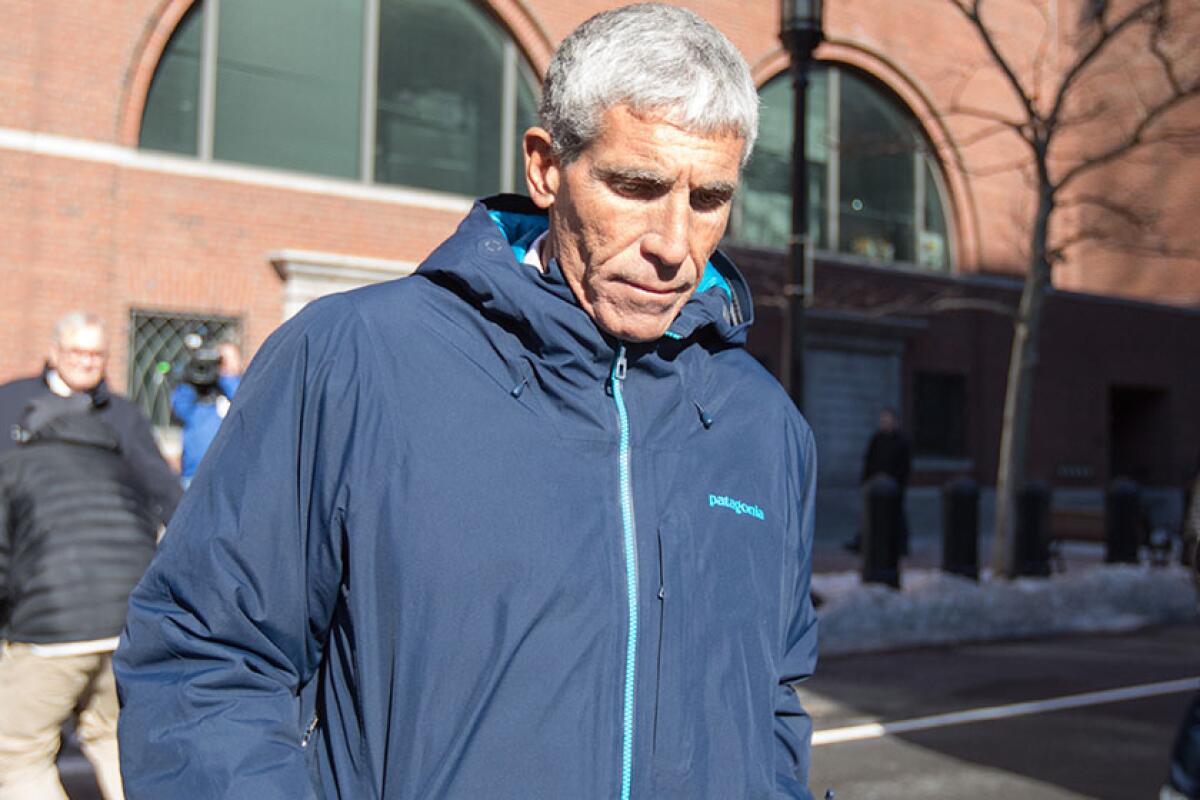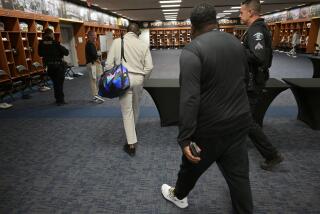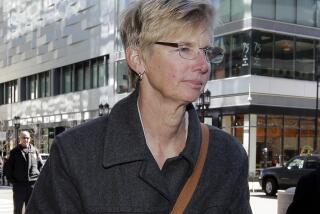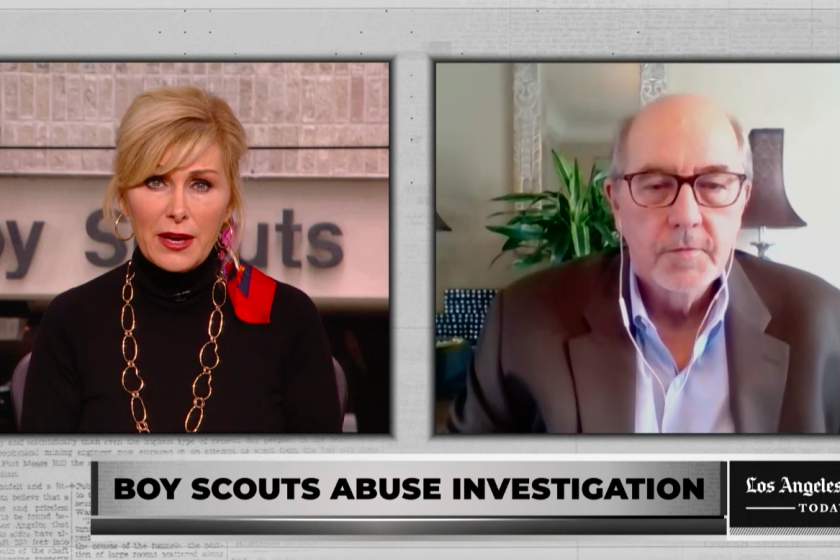Could UCLA have stopped Rick Singer and the admissions scandal 5 years ago?

Five years before William “Rick” Singer became known as the mastermind of the nationwide college admissions scandal, an internal investigation at UCLA uncovered key elements of his scam.
The first indication of trouble came in a phone call to the school on May 13, 2014. The mother of a high school student wanted to appeal the university’s decision to reject her daughter’s admission as a water polo recruit. The daughter had never played the sport.
“During this conversation,” a report on the investigation said, “the mother stated she was ‘still willing to pay.’ When asked to what she was referring, [the mother] explained that she understood from [Singer] that she was expected to donate $100K to the program, for the admission of her daughter through athletics.”
The report shows UCLA had gathered evidence echoing the allegations in this year’s criminal case against Singer and showing that he was attempting to manipulate admissions to one of the nation’s most celebrated collegiate sports programs. University officials were concerned enough to interview Singer, who denied wrongdoing, and brief UCLA Chancellor Gene Block on the investigation.
Beyond water polo, the report said, Singer advised at least two students who were recruited for the UCLA men’s tennis team even though the school characterized their athletic ability as “limited.” After their admission, their parents made significant donations to the tennis program.
UCLA spokesman Tod Tamberg said the school responded to the report with a range of reforms, including a ban on donations from families of athletic recruits until they enrolled. A handful of coaches also were disciplined.
Singer, however, continued to forge close ties with the school, hosting summer workshops on the Westwood campus. Federal prosecutors allege he also paid $200,000 in bribes to UCLA’s men’s soccer coach to help admit two students as fake soccer recruits.
Several legal and higher education experts told The Times the report shows the university missed an early opportunity to stop Singer.
“UCLA should have immediately notified law enforcement authorities,” said Bradley Simon, a former federal prosecutor whose practice areas include white collar criminal defense and corporate investigations. “Had they done so at the time, UCLA would not be enmeshed in the current scandal.”
Tamberg defended UCLA’s response, saying Singer was not the focus of its investigation, which also examined a second suspicious athletic recruitment that did not involve the consultant. The inquiry, Tamberg said, was designed to ensure that UCLA’s athletics department policies complied with University of California rules prohibiting any consideration of financial benefits during the admissions process.
“Singer was interviewed as part of the investigation and denied representing that admission could be gained in exchange for a financial contribution,” Tamberg said.
A copy of the report was given to UCLA Athletics Director Dan Guerrero. Several other UCLA departments, including human resources and legal affairs, “scrutinized” the matter, according to the university.
Tamberg said the school educated coaching and development staff about not discussing donations before a recruit’s admission. Asked if the school regretted allowing Singer’s workshops on campus, Tamberg said “no allegations of criminal activity” were made against Singer or his company by law enforcement or the media until this year.
In March, prosecutors accused Singer of running the most prolific college admissions con ever uncovered by U.S. law enforcement. Fifty-one people have been charged, including celebrities and business executives who hired Singer as well as coaches from such elite schools as Yale, Stanford, Georgetown and USC who were accused of selling spots that their schools reserved for recruited athletes.
As part of his guilty plea, Singer admitted to orchestrating a wide-ranging scheme that included paying bribes to college coaches to designate his clients as recruits and fabricating sports resumes for clients who had limited or no athletic experience. He has yet to be sentenced.
The Times obtained a heavily redacted copy of the report and attached exhibits from UCLA through a public records request. The newspaper separately reviewed significant portions of an unredacted version.
Additional records obtained by The Times show Singer’s connections to UCLA date back to at least 2008, when he donated $30,000 to the school’s recreation department. Internal emails also show Singer or his associates corresponded with three UCLA head coaches other than former men’s soccer coach Jorge Salcedo as early as 2012, though there’s nothing in the messages to suggest they knew about his illegal activities.
The university’s 2014 investigation was conducted by William Cormier, then director of the school’s administrative policies and compliance department. Cormier, who retired from UCLA in 2017, did not respond to messages seeking comment.
According to the report, Cormier interviewed the mother whose daughter had been rejected as a water polo recruit. She told Cormier she retained Singer for $6,000 in August 2013 to provide biweekly college counseling sessions for her daughter. The mother, whose name is redacted in the report, said Singer “strongly encouraged” her to be prepared to donate to UCLA and suggested $100,000.
“[The mother] said she understood [Singer] to say that ‘some of this donation would go to UCLA directly’ and some to the coaches through his company,” the report said.
There’s no indication in the report that the mother made a donation or that coaches received money connected to her daughter’s application.
Because the daughter played high school tennis, the report said, Singer arranged an introductory meeting between the mother, daughter and UCLA men’s tennis coach Billy Martin in October 2013. Martin acknowledged in the report that he had known Singer for about 10 years.
The mother said that at the meeting Martin mentioned he knew Singer well, the report said, and “that he had found him many great scholar athletes, and that he was impressed with [the daughter’s] grades, test scores, and athletic history.”
During the investigation, Martin said Singer had “described the family’s situation and that they could be expected to support the program if [the daughter] were admitted,” but Martin said Singer did not discuss any commitment amount, according to the report. Martin denied ever receiving compensation from Singer, and he said he would never discuss a donation with the family of a prospective recruit, the report said.
Singer told the mother a few weeks later that the women’s tennis roster was full, but the school’s seven-time NCAA champion women’s water polo team had room. He pledged to make arrangements for an introduction to the coach.
In December 2013, the mother and daughter met with women’s water polo coach Brandon Brooks. The daughter emailed Singer later that day for advice on how to handle never having played water polo.
“He was really nice,” the daughter wrote in an email thread attached to the report as an exhibit, “but told me he wasn’t quite sure what to do with me regarding having me listed on the team as a player, or as a manager.”
Singer responded: “Tell him you will be listed either way — if a player for admissions sake, I obviously will not play but come to practice but take on the role as manager or you can say manager from the start but it is probably easier to do player. I have a friend ... that can create a profile if needed for polo.”
The name of the friend is redacted.
Shortly after his meeting with the daughter, Brooks entered her into the school’s admissions system for recruited athletes. The system allows recruits to bypass the highly competitive process for regular applicants and instead be reviewed by the Student-Athlete Admissions Committee. School policy bars using the system for managers or athletes who aren’t qualified to compete in their sport. A UC System rule in place since 1998 also prohibits admissions motivated by fundraising.
Brooks said he had never met Singer and didn’t know about his involvement until the investigation began, according to the report. The coach left UCLA in 2017. Brooks and Martin did not respond to requests for comment.
On Dec. 15, 2013, Singer texted the mother: “Just wanted to let you know everything is all set ... there is no question she will be approved without a second thought. HAPPY HOLIDAYS!!!!”
The committee approved the daughter’s admission as a recruited athlete in late January.
Two months later, the report said, an unidentified athletic department official discovered the daughter had no water polo experience. The admission was rejected.
Citing privacy concerns, UCLA wouldn’t say if the daughter was eventually readmitted.
The investigation also examined men’s tennis recruits from 2004 to 2014 whose ability was characterized by the school as “limited.” The report said families of “a relatively high percentage” of those recruits donated significant amounts to the tennis program; UCLA redacted the actual number from the report it provided The Times. But the report said at least two of the recruits had retained Singer.
“The involvement of [Singer] in these admission instances, as he was in the [water polo] admission matter, adds to this concern,” the report said.
There was no evidence the donations occurred at the time of admission, the report said, but “the pattern suggests that an expectation that a donation might be forthcoming was a factor in the decision to admit.”
During a telephone interview with Cormier, Singer complained that the water polo recruit’s mother “was difficult to deal with” and had “unrealistic expectations” about her daughter’s chances of admission. He acknowledged he brought up “expected donations” to the athletic department.
“If someone helps you, it would be good if you help them back,” he said he told her. He described a donation “‘as a show of appreciation.’ He said he would give that advice to any family. ... He denied representing to her that such an amount was a way to buy [the daughter’s] admission.
“When asked what he would have expected to get from the mother or the coaches had such a donation been made, he said emphatically, ‘not one dime.’”
The report doesn’t say if Cormier asked Singer about the email offering to create a fake water polo profile; UCLA said no additional investigation was conducted into the email.
Less than a month after Cormier’s report was issued in July 2014, Singer’s company, The Key, held a four-day workshop at UCLA to help students become social media influencers. An advertisement for the event proclaimed: “It isn’t just what you know; it’s who you know and knows you that will make things happen.”
The annual summer workshops took place as recently as August 2018, when The Key paid UCLA more than $65,000 for catering, lodging, room rental and parking, according to invoices from the school.
Earlier this year, a UCLA spokesman said, the school turned over a copy of the 43-page report to federal prosecutors as part of its cooperation with the criminal investigation into Singer.
Michael Buckner, an attorney who specializes in sports and education law, said the university did the right thing in launching an investigation but should have referred the findings to federal authorities years earlier and conducted an expanded audit of athletic admissions at the time.
Hui Chen, a compliance and ethics expert who previously consulted for the Justice Department, credited UCLA for the initial probe, but said additional steps could have followed.
“I’d say to the coaches who might consider working with him, ‘We’re onto you. Be careful,’” she said. “Let people know that we’re onto this kind of scam.”
Times Staff Writers Matthew Ormseth and Richard Winton contributed to this report.
More to Read
Start your day right
Sign up for Essential California for news, features and recommendations from the L.A. Times and beyond in your inbox six days a week.
You may occasionally receive promotional content from the Los Angeles Times.






